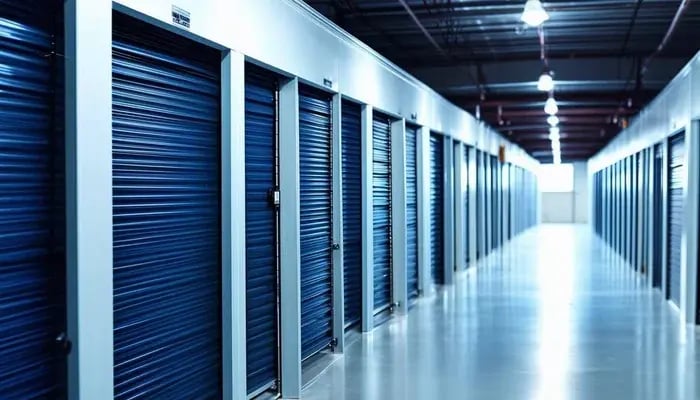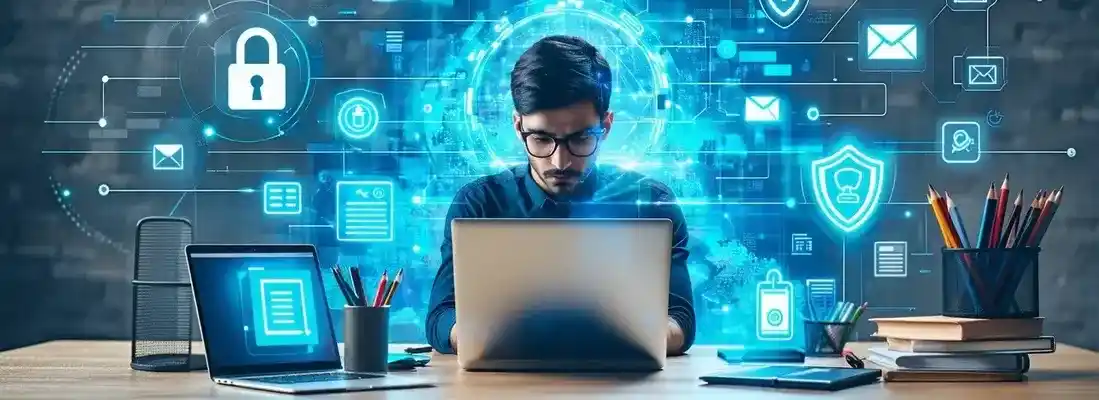Protecting Your Assets: IT Security in Self Storage
Date: 15 October 2024

As the self-storage industry continues to grow, the importance of IT security in protecting sensitive data has become increasingly critical.
Historically, self-storage facilities focused primarily on physical security, such as locks and surveillance cameras. However, with the rise of digital technology and online management systems, the risk of cyber threats has also increased.
Today, many self-storage businesses handle customer data, including personal information and payment details, making them attractive targets for cybercriminals. A single data breach can lead to significant financial loss and damage to a company's reputation.
Therefore, understanding and implementing robust IT security measures is essential for safeguarding assets and maintaining customer trust.
This blog will explore key strategies for enhancing IT security in self-storage facilities, ensuring that both the physical and digital aspects of asset protection are addressed comprehensively.
Understanding Cyber Threats
In the self-storage industry, understanding cyber threats is vital for protecting sensitive customer information and company assets. As storage facilities increasingly adopt digital management systems, they become more vulnerable to various cyber risks, including data breaches, ransomware attacks, and phishing scams. These threats can compromise not only personal information but also financial data, leading to significant repercussions for both the business and its clients.
For instance, facilities offering specialized services, like climate-controlled storage in New Hampshire, may hold sensitive data regarding the storage conditions and personal items of customers.
As such, the potential for cybercriminals to exploit weak points in a facility's IT security infrastructure is heightened. Recognizing these threats enables self-storage operators to implement proactive measures, protecting their assets and maintaining customer trust in an increasingly digital landscape.
Note: A study found that over 70% of small businesses experience a cyberattack within a year, highlighting the need for robust security measures.
Secure Access Controls
Implementing secure access controls is a crucial step in protecting sensitive data within self-storage facilities. Effective access management ensures that only authorized personnel can access critical systems and customer information. This not only minimizes the risk of unauthorized access but also enhances the overall security of the facility.
Key components of secure access controls include:
- User Authentication: Employing strong passwords and multi-factor authentication to verify user identities.
- Role-Based Access: Granting permissions based on job roles to limit access to necessary information only.
- Regular Audits: Conducting frequent reviews of access logs to identify any unusual activities.
- Visitor Management Systems: Monitoring and controlling who enters and exits the facility.
- Training Programs: Educating employees on the importance of access controls and security protocols.
An expert notes that “effective access control is essential for safeguarding sensitive information in the self-storage industry.” By prioritizing these measures, self-storage facilities can significantly reduce their vulnerability to cyber threats.
Data Encryption Methods
Data encryption is a critical aspect of IT security for self-storage facilities, as it protects sensitive customer information from unauthorized access. By converting data into a coded format, encryption ensures that even if cybercriminals manage to infiltrate a system, they cannot easily access or interpret the information.
This is particularly important for self-storage companies that handle personal data, payment information, and inventory details. Implementing robust encryption methods for both data at rest and in transit is essential for safeguarding against potential breaches.
Research published in the International Journal of Information Security shows that organizations employing strong encryption practices significantly reduce their risk of data breaches.
An expert highlights that “encryption is not just a technical measure; it's a crucial part of building customer trust.” Facilities should utilize industry-standard encryption protocols, such as AES (Advanced Encryption Standard), to protect their digital assets.
Additionally, regular updates and audits of encryption practices can further strengthen security. By prioritizing data encryption, self-storage facilities can create a safer environment for their clients, ultimately enhancing their reputation and operational integrity in a competitive market.
Regular Software Updates
Regular software updates are essential for maintaining robust IT security in self-storage facilities. Cybercriminals often exploit vulnerabilities in outdated software to gain access to sensitive information. By staying current with updates, facilities can significantly reduce the risk of cyberattacks.
Implementing a routine for updates can include:
- Operating System Patches: These updates fix security vulnerabilities in the operating system.
- Application Updates: Regularly updating software applications ensures they have the latest security features.
- Security Software Upgrades: Keeping antivirus and firewall programs up to date is crucial for protection against malware and unauthorized access.
By prioritizing software updates, self-storage facilities can safeguard their data and enhance their overall security posture. A proactive approach to updating systems not only protects sensitive information but also builds trust with customers, who expect their data to be managed securely. Staying vigilant in this regard is key to protecting assets in an increasingly digital world.
Employee Training and Awareness
Employee training and awareness are crucial elements in enhancing IT security for self-storage facilities. One effective approach is to conduct regular training sessions that educate employees about common cyber threats, such as phishing attacks and ransomware. This hands-on approach helps staff recognize potential risks and respond effectively. However, organizing frequent training can be resource-intensive and may disrupt daily operations.
Alternatively, implementing ongoing awareness programs through newsletters or online resources can keep cybersecurity at the forefront of employees' minds. This method is less disruptive but may not provide the in-depth knowledge that formal training sessions offer.
Some facilities choose to collaborate with cybersecurity software providers for specialized training, which can be beneficial but often comes with added costs. Ultimately, the best strategy may involve a combination of these approaches, ensuring that employees are well-informed and equipped to handle cybersecurity challenges. By investing in employee training and awareness, self-storage facilities can create a strong defense against cyber threats and foster a culture of security throughout the organization. For further insights, exploring effective cybersecurity software can greatly enhance these training efforts.
Final Thoughts on IT Security
Ensuring robust IT security in self-storage facilities is essential for protecting sensitive data and maintaining customer trust. By understanding common cyber threats and implementing secure access controls, businesses can safeguard their digital assets effectively.
Emphasizing data encryption, regular software updates, and employee training further strengthens a facility's defenses against potential attacks. Additionally, investing in advanced cybersecurity software can provide an extra layer of protection, helping to mitigate risks and enhance overall security posture.







